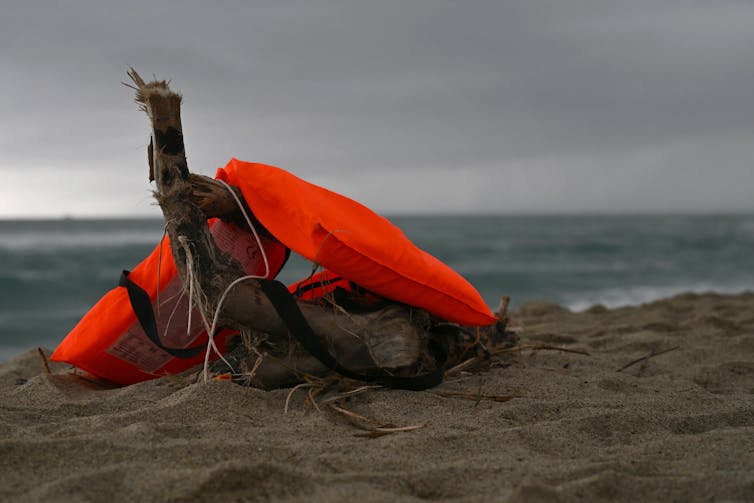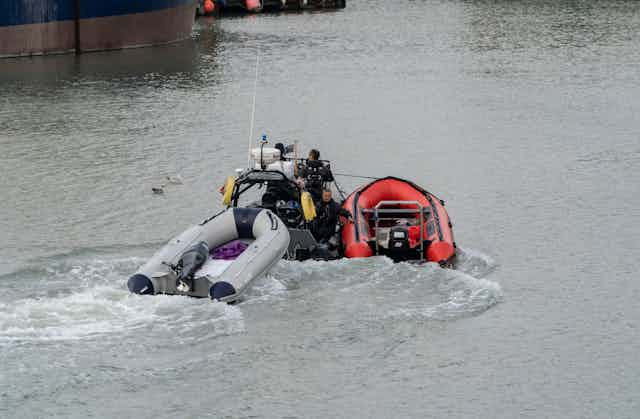The illegal migration bill is the government’s latest proposal to tackle the rise in small boat Channel crossings, by detaining and removing anyone who arrives in the UK without valid permission to enter.
The government hopes the bill, currently in committee stage in the House of Commons, will deter migrants from relying on smugglers to reach the UK. Anyone arriving by small boat won’t be able to claim asylum, will be swiftly removed to Rwanda (or another third country), and barred from ever entering the UK again. If this is what you are faced with, why would you pay a smuggler for such a dangerous trip?
This isn’t the government’s first go at this deterrence approach. In June 2022, the Nationality and Borders Act made arriving in the UK without a valid entry clearance – and facilitating such arrivals – a criminal offence. As of April 2022, anyone crossing the Channel on a dinghy can be prosecuted as a criminal.
Home Office figures show that between June and November 2022, an estimated 29,400 migrants arrived in the UK on small boats. Of these, only 96 (0.3 %) were arrested on suspicion of committing the new crime of illegal arrival. Just 78 were later charged, of whom 56 have been so far convicted. The number of people arrested and charged for the facilitation of arrival (steering the boats) has not been made public by the Home Office, but is likely to be smaller still.
Critics of the bill, including Labour shadow secretary Yvette Cooper, have said that instead of focusing on deterrence, the government should crack down on smuggling gangs. But taking a more heavy handed approach to smugglers won’t deter people from seeking their services.
Italy and Greece have prosecuted thousands of supposed smugglers in the last few years. But there is no evidence that this has effected migrants’ decisions to cross the sea. Rather, policies of deterrence against smuggling fuel smuggling itself, forcing routes to become more dangerous, smugglers more organised, and migrants less able to cross borders without their services.
Organised smuggling thrives in illegality
Europe fortified its borders by increasing border security and sponsoring cooperation agreements with neighbouring countries such as Turkey and Libya following the 2015 spike in border crossings. But without addressing the reasons why people migrate irregularly in the first place, this simply increased the request for smugglers.
People smugglers have upped their game all over the main entry routes to Europe, including the Balkan route, eastern Europe, the Atlantic route and the routes across Pakistan, Iran and Turkey. Their services vary according to how much can one afford. Different fees buy different types of passage by sea or land, from risky, crammed old boats to safer journeys “guaranteed” through bribes to border officers.
In July 2022, European law enforcement agencies Europol and Eurojust announced the outcome of the “biggest ever international operation” against people smugglers, coordinated between France, Germany, Belgium, the Netherlands and the UK. It led to the arrest of 39 suspects. The agencies have not publicised more information on whether these were actually members of the same smuggling network, or how many were ultimately sentenced.
European agencies often disclose information about those arrested as smuggling suspects but less data is made public on how many of these arrests actually lead to convictions. Research suggests the main outcome of most counter-smuggling operations is to reduce small scale smuggling, usually organised ad hoc by migrants themselves.
As former Frontex director Gil Arias confirmed in 2022, very few large smuggling groups have been stopped by European law enforcement. This is partly due to operational difficulty – “big” smugglers mostly operate from neighbouring countries and never climb on the boats themselves – and partly to the lack of evidence of large, transnational organised crime groups being involved in migrant smuggling in the first place.
Those arrested and sentenced to jail in countersmuggling operations are mostly migrants who have been steering or agreed to captain the boat in exchange for a lower fee to cross. The same dynamic is reported happening in the Channel, where the maximum penalty for boat pilots has been raised to a life sentence.
Making migration more dangerous
One common effect of harsher border policies is the displacement of migration routes to more dangerous methods and locations. Last month, 72 migrants drowned after their boat, which departed from Turkey, crashed off the Italian Calabrian coast. The sea route from Turkey to Italy is not new, but until recently had remained relatively unfrequented due to its high risk and the easier availability of routes to Greece. But as Greek authorities have been accused of performing illegal pushbacks (abandoning asylum-seekers at sea or forcing them back to another state) in the Aegean sea, the numbers on the Turkey-Italy route have doubled.

Similar trends are apparent in the Channel. Growing security controls at the port of Calais, including thermal scans and higher surveillance around the port’s perimeter, have reduced the number of people attempting to cross the border by climbing on the back of trucks. But rather than stopping them from migrating altogether, small boat crossings have become the method of choice.
Meeting with French President Emmanuel Macron, Rishi Sunak pledged £500 million over the next three years to increase the operational capacity of French border police and construct a new detention centre in France. More policing of the Channel could push boats to leave from further away such as Normandy and Belgium, raising the risk of shipwrecks.
Instead of crushing the smuggler’s business model, deterrence policies risk galvanising the smuggling economy, making refugees and migrants more prone to abuse and risk, but without affecting the root causes of their migration.
The way to counter the smuggling business model is to provide better options to those who want to migrate – the “safe and legal routes” that politicians are often encouraging migrants to use, but in reality for most, don’t actually exist.

